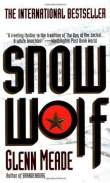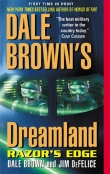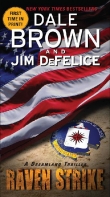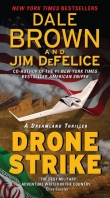
Текст книги "Black Wolf"
Автор книги: Dale Brown
Жанр:
Боевики
сообщить о нарушении
Текущая страница: 19 (всего у книги 24 страниц)
56
Over the Atlantic Ocean, approaching Europe
The C–20B was an Air Force spec Boeing 737. While not nearly as luxurious as the standard corporate configuration of the plane, it was a VIP jet, with a number of features that anyone who ever had to fly in the belly of a C–5A or C–130 would have killed for.
Case in point: Breanna’s seat. It moved back, so it was essentially an inclined bed, about as comfortable as you could get in an airplane cabin without actually having a bed.
Breanna, however, found it uncomfortable. And even when she finally decided she’d be best off taking a nap before landing, had an almost impossible time dozing off. Finally she fell off into a fitful sleep, images flitting through her mind, ideas and arguments.
“W hy didn’t you save me?”
The voice came from across the river. She jumped from the bed—she was still in the tent.
“Why didn’t you save me?” asked Mark Stoner.
She reached over to get Zen, but he was gone.
“Breanna—I saved you.”
“Mark? Are you out there?”
“Where are you?” he said.
She knew it was a dream—it could only be a dream—and yet it felt so real that it wasn’t a dream. It was something between a dream and reality, its own category.
“Where are you?” she asked. She pushed out of the tent, still in the sweats she had gone to sleep in. The air was cold. She felt goose bumps forming on her legs and neck. Her hands were so cold they were hard to move. She clasped them under her arms to keep warm.
“Why didn’t you help me?” he asked. “I saved you.”
“We saved each other,” she said. “Do you remember—we jumped.”
Had they jumped? Or was that with Zen? Now she couldn’t remember—Zen had saved her once, in India, had protected her and gotten them rescued. It was Zen, Zen who had saved her.
But she’d parachuted another time. Stoner was there—who had saved who?
God, she couldn’t remember.
They’d been together in the water.
It was a dream but it felt too real, as if they were there together now.
“Mark? Mark, are you OK?” she asked.
“I have to kill them now,” he said.
She screamed.
“Ma’am, you OK?”
Breanna opened her eyes and saw the Defense Department aide standing over her, a very concerned look on her face.
“I—just had a very, very bad dream,” Breanna told her.
“Can I get you something? Ambien?”
“No, that’s all right.” Breanna pushed the seat upright. She wasn’t sure she wanted to go back to sleep after that. In fact she was sure of it.
“We still have a long way to go,” said the aide. “We’re stopping in Sicily to refuel. We won’t be touching down in Prague until early morning. It’d be good to try and sleep if you can.”
“Thanks. If I need a pill, I’ll ask.”
“Yes, ma’am.”
Breanna thought of calling Zen and Teri. She longed to hear their voices. Zen’s especially.
But she was being silly. The Wolf operation had been smashed, and while Danny thought Stoner might be the man who’d blown himself up in the building, Breanna realized that the DNA match must have been a fluke. Poor Mark had died in the crash fifteen years ago. Very possibly his body had disintegrated immediately.
She was sorry for him, dreadfully sorry. But she’d already grieved his passing.
“Maybe I will take the pill,” she told the aide. “If you can guarantee to have plenty of coffee to wake me when we get to Prague.”
57
Northwestern Moldova
Nuri pushed the spade into the dirt, hammering down with his right heel against the top of the shovel. The box had been buried quite a while ago; the ground was hard.
The radar had reported it was two meters below the surface—six feet. That didn’t sound like much, until you started digging. The first foot or so was tough—a shrub had grown almost exactly over the box, and there were tree roots on the side to contend with. The next foot or so was somewhat easier, though the clay soil only reluctantly gave way.
The rest was hell. It didn’t help that it was after midnight and he’d been awake for a millennium. Or so it seemed.
He pushed downward in a circle, working his way around as he created a funnel. The moon was nearly full, but the sky was filled with clouds, and the only light came from two battery-powered lanterns loaned by the Moldovan police contingent guarding the house.
He’d asked the deputy minister if they had a backhoe. Lacu wasn’t sure, but promised to look into it by morning. Nuri figured he’d be halfway to China by then.
Or maybe not. Five feet deep in the hole, and he was ready to drop his concerns about letting the Moldovans see whatever was in the box. But it didn’t make sense to stop now. He knew he was close. He poked and attacked with the shovel, using it as a pick.
Finally he hit something hard.
He scraped, pried, scrambled up for one of the lanterns.
Back in the hole, he dug at it with his hands.
It was a rock.
Ten minutes later, he pried the rock away and found the box.
Two of the men who were guarding the house came up as he was pulling it from the ground.
“I could have used you guys a half hour ago,” he said in English, pushing it ahead of him as he clambered up the side.
“Moltumesc,” said one of the men, taking the box.
“Give me a hand, would you?” Nuri asked.
“Da,” said the man.
The other smashed Nuri in the back of the head with his rifle, sending him tumbling back into the hole.
58
Kiev, Ukraine
Hera was surprised to find Danny up and sitting at their laptop when she and McEwen returned to the hotel suite.
“I thought you were sleeping,” she said.
“I did.”
“What, for two hours?”
“You going to mother me, too, are you?” he asked, unfurling his bare feet from beneath him and standing. “Do either of you know how to work the coffee machine?”
“It’s busted,” said Hera. “I meant to ask for a new one.”
Danny frowned. “So what’s going on?”
McEwen told him about the guns. Hera, meanwhile, used the laptop to see if MY-PID had gotten any more information about the weapons and the hangar.
The serial numbers on the rifles indicated they were genuine, manufactured in 1953 for the Soviet army. They belonged to a lot that had been declared obsolete by the government more than a decade before. There was no other information about those specific guns, and the type was so common—literally ubiquitous—that trying to correlate them against known gun sales, legal and illegal, was impossible, even for MY-PID.
Information on Duga, the company that had leased the hangar, was far more limited—and therefore considerably more useful. It had leased a similar building at a regional airport in France two years ago; there had been an assassination tied to the Wolves there as well. Following transfers of money from its accounts, MY-PID discovered an HSBC bank account that had been tapped for cash in three different cities near where Wolf murders had taken place.
More interesting was the fact that the account had made a large transfer to an Austrian bank account, which in turn was tapped twice in the past two days in Prague.
“So there’s someone in Prague?” said McEwen.
“Maybe,” said Danny.
Hera asked the computer for more information on the bank account and the withdrawals. It didn’t have any—the account had only been opened a few days before.
“No other connections?” McEwen asked after the words null set appeared on the screen.
“Not yet,” said Hera. “It’s thinking.”
“Well let’s think ourselves—why would someone from the organization be in Prague?”
“Part of their getaway,” said Hera. “They need a clear path out. New identities, that sort of thing.”
“So whoever dropped the guns off then moved on to Prague,” suggested McEwen.
Hera tested the theory by trying to find correlations between the account and recent airline travel between Kiev and Prague. MY-PID found nothing usable.
“How much money did they take out?” Danny asked.
“Six hundred euros,” said McEwen. “Twice. Walking around expenses.”
“But why didn’t they bring it in themselves?” Danny asked. “If it was someone assigned to clear the way for an escape, they would come in with the money.”
“It could be a handoff to someone,” said McEwen. “You can’t carry too much cash across the border. Generally you’re not stopped, but if you have more than a few hundred euros, there will be questions.”
“This was only twelve hundred.”
“Twelve hundred is still a lot, at least where I come from,” said McEwen. “But you’re forgetting—these are the transactions we know about. There could be another ten. They could be planting the money for the people coming through. Hiding it for them. Or spending it.”
“Why escape through Prague, though?” asked Hera. “If you can fly anywhere, either go to Russia or go somewhere with more connections.”
“Damn,” said Danny.
Hera looked up from the computer as he continued.
“Get all the information you can about an air show in Prague,” he said. “And get some coffee up here from room service. Find out where Nuri is—call him and tell him I need to talk to him.”
“What are you doing?” asked Hera.
“Getting my shoes. Then going to Prague.”
59
Northwestern Moldova
The pain swirled around Nuri’s head. He felt as if he was flying through a wind tunnel, spinning around at the center of a cyclone.
Then he landed, crumpling into a pile in the corner of a dark room.
Something hit his chest, then his leg, then his chest again. It was diffuse, a cloud of weighted pain falling on him, like snowballs or rain.
Or shovelfuls of dirt.
Something hit his face. A rock.
Another shovelful on his legs.
Nuri couldn’t move. He tried to open his eyes, but all he could see was black.
60
Outside Prague
“It is 12:05. You are five minutes late. Why are you late?”
The plainclothes security guard turned his eyes toward the carpet. Like the sergeant, he was Polish, a member of the state security force assigned to escort the Polish delegation to the air show.
“Who is your superior?” demanded the sergeant.
“Captain Klose.”
“Klose is an idiot. Take your position next to Stefan. Don’t move for the next four hours—not even to relieve yourself.”
The guard took his position opposite the other guard next to the hotel room door. The Polish air ministry had taken much of the hotel, including the entire top floor, where all eight rooms were reserved for the Polish air minister and his guests. This was a bit excessive; besides the minister’s suite, none of the other rooms were occupied. Two would be used for a reception later that night, and the others were available in case the minister decided to invite guests to stay.
But the security people weren’t in a position to complain about the minister’s spendthrift ways. Their rooms, scattered throughout the hotel, were hardly austere, and came fully stocked with alcohol and sweets.
They were also booked one to a room, a boon to the man who had just come on duty.
“What are you looking at?” demanded the sergeant, turning to the second man manning watch.
“Nothing, Sergeant.”
“The men from Warsaw think they are better than the Krakow detail, is that it?” The sergeant turned back to the man who had just arrived. “And you are Exhibit A of this.”
“I am sorry I am late.”
“You don’t know me, but you will,” continued the sergeant. “The minister is not to be disturbed. You will be relieved in four hours. Neither of you is to go anywhere. No one is to be admitted on the floor without the minister’s approval. A woman…”
The sergeant paused, deciding how to phrase what he was about to say. He looked at the guard from Warsaw.
“The minister may have guests,” he said finally. “Treat them professionally. Be—judicious.”
“Of course,” said the man.
“You will report to me at 0900 hours.” The sergeant pointed at the guard who had been late. “We will discuss the importance of promptness, and your future in the security forces.”
The guard glared at him, but said nothing. The sergeant shook his head, then stalked off.
“Five minutes, what a jerk,” said the guard who had been on time. “As if it would make a difference. You think he has a girl waiting?”
The other guard said nothing, adjusting his jacket above his bulletproof vest. He started to hitch his pants, then turned away out of modesty.
“You’re from Krakow. That’s the real problem. The sergeant hates everyone from outside Warsaw. The whole idea of drawing people from across the country, as if this were some sort of lark—”
The guard stopped speaking in mid-sentence and slumped to the floor, killed by a single shot to the brain from the silenced .22 in the Black Wolf’s hand.
The Black Wolf reached down and took the man by the shoulder, propping him against the wall. Then he slipped a passkey into the door of the hotel room, and let himself inside.
61
Kiev, Ukraine
Danny was almost to the door when Hera stopped him. She had her MY-PID control unit in her hand.
“Nuri isn’t answering,” she said.
“Probably sleeping,” Danny told her.
“No—he’s at the farm. And look at his vitals—his heart’s pumping.”
Nuri’s pulse, recorded by his bracelet, was at 140.
“Something’s wrong,” said Hera.
“The deputy interior minister in charge of the state police who worked with us on that raid,” said Danny, reaching for his sat phone. “We need to talk to him right away. MY-PID should have the contact information somewhere. Get it quick.”
62
Northwestern Moldova
The weight on Nuri’s chest and arms was incredible. He pushed his head to his right, and at the same time scratched through the dirt with his right hand, trying to reach his nose and mouth. He got there finally, cupping a little space over it.
The bastards!
Buried alive!
Out!
He struggled, but the more he struggled, the more dirt seemed to fall. He tried to wiggle to the right. Dirt fell on him there. Left—more dirt.
He wasn’t too deep. He could dig himself out. He could.
His lungs were starting to feel tight, compressed. Nuri pushed his hand over his mouth, making a little pocket for air.
He should wait for them to go away. Wait.
For what? Death?
He was down five feet. Dig, for Christsake!
Nuri tried pulling his left arm up, pushing through the weight that kept it pinned by his side. He pushed hard, but it wouldn’t budge. Then he tried a softer approach, moving it as if it were a snake.
Or a worm. He was a worm. He had to think of himself as a worm, squeezing through the ground, getting out.
A worm.
Is this where he was going to die? In the middle of nowhere in a small country where people wouldn’t even be able to pronounce his name?
I have to get out now. Now!
He curled the fingers on his left hand into a claw and began pushing at the dirt. It seemed to give way slowly.
But it was too slow. He was starting to choke.
Everything! I need everything!
Nuri pulled his other arm up and began to push. He curled his upper lip over his lower lip and tried breathing through his mouth. There was dirt in his teeth. He tasted rot.
Nuri pushed.
Out! Out!
The ground seemed to give way. He moved his elbows toward his ribs, then levered them back against the ground beneath him.
Out! Out!
He couldn’t breathe. He was choking—it felt as if his lungs were full of dirt.
Out! Out!
He pushed with everything he had. And suddenly he felt air on his face.
People were yelling in the distance, calling his name. The two men who had buried him were gone.
Nuri pushed himself to his knees. He was still half buried, covered with dirt. He reached his hand into his pocket and found the MY-PID unit.
“I need the words for ‘seal off the area,’ ” he told the computer. “I need the words for ‘not one motherfucker leaves.’ ”
63
CIA Headquarters, Virginia
Jonathon Reid frowned as he scrolled through the list of intercepts. There were several screens full—more than a hundred messages.
The sheer number alone was significant. Add to that the fact that they came from military units spread around the country, and the conclusion was inescapable: the Ukraine army was about to revolt.
But Reid smelled a rat.
He moused over to the folders with the latest satellite images. There were unmistakable signs that two of the units in the eastern part of the country were mobilizing. And there were no corresponding orders indicating that they should do so.
Concrete evidence of a coup, especially when coupled with the intercepts.
Still—a coup with the NATO ministers about to descend on Kiev? How very convenient for the Russians.
“Mr. Reid, the director is waiting.”
Reid looked up at his assistant, Mark Dalton. Dalton, a field officer who had been rotated back home following an injury in South Asia, wore an exasperated expression—pretty much the one Reid always saw.
“I’m just reviewing the data he’s going to be interested in,” said Reid. He cleared his screen and got up from his desk.
“You don’t think it’s a coup?” asked Dalton. He’d come on duty at 6:00 A.M.; he’d been working for more than twelve hours and was very likely to be here for several more.
“I think someone wants us to think it is, yes,” answered Reid.
“But you don’t.”
“It looks so much like a coup it could come out of a textbook,” Reid answered. “And real life very rarely resembles what goes on in the classroom.”
Reid made the same argument upstairs in the director’s conference room twenty minutes later, this time in front of a packed house of CIA officials, including Herman Edmund, the Agency chief. Several members of the Joint Chiefs of Staff and their aides were watching via video from the secure center at the Pentagon, and an equal number of NSC people were over in the White House situation room. Reid, speaking after the Agency’s in-house experts of Ukraine had made a case for the coup, patiently dissected the intercepts.
“What you’re saying is that it’s too perfect,” objected Stephen McGovern, the Agency’s ranking analyst for Eastern Europe. “That’s really a difficult argument, Jonathon. What would be the point?”
“The point would be to disrupt the NATO meeting. Showing that the country is unstable. Without, of course, having to go to the trouble of actually encouraging a coup.”
“It’s a lot of trouble,” said McGovern.
“Not very difficult to do,” said Reid. “The Russians break into the network and send a lot of messages. They get two divisions to move their units around. Bribe the right officer, and these trucks will drive to Paris. It’s no secret how badly most of these troops are paid.”
“But what would the point be?” said Edmund. “That’s the real question. Let’s say that it is fake—we’ll know it in a few hours.”
“A few hours’ indecision may be all it takes,” said Reid. “But we may only be seeing the opening act. There may be more. It may end up looking as if a coup was planned, and then aborted for some reason. And it’s not just us—every Western intelligence agency is seeing these intercepts. Even the French have them.”
“Well, that is an indictment,” said Edmund.
Everyone laughed.
The meeting proceeded quickly to the conclusion favored by the analysts: a coup might be under way in the Ukraine within a few hours. Reid succeeded only in getting them to emphasize the word “might” and add a few caveats to their alert. Given the tendency of the analysts to stay away from any definitive statement that might come back to haunt them, it wasn’t much of a victory.
Director Edmund stopped him at the door as he was leaving.
“If you have a moment, Jonathon.”
“Always for you, sir.” Reid stepped back as the others filed out.
“Whiplash was successful?” Edmund asked when they were alone.
“The action in Moldova eliminated everyone at the farm,” said Reid. “There were about a half-dozen people, Russians we think, and they all appear to have been associated with the Wolves.”
“Is it possible these intercepts were related to what they had planned?” said Edmund. The operation against the Wolves was still so secret that neither Reid nor Edmund had shared it with the others.
“I didn’t bring it up because the timing of this activity seemed wrong,” said Reid. “If there were a direct link, then we wouldn’t expect these messages until at least the day after tomorrow when the NATO ministers gather.”
“My thoughts exactly,” said Edmund.
“Unless there’s something we’re missing.” Reid smiled. “It’s too pat. It seems so obvious I wouldn’t even give it to a junior officer as an exercise.”
“You do like complications,” said the director.
“A character flaw, I’m afraid. Hopefully, not fatal.”








